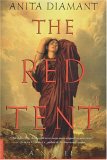Summary | Excerpt | Reading Guide | Reviews | Readalikes | Genres & Themes | Author Bio

Prologue
We have been lost to each other for so long.
My name means nothing to you. My memory is dust.
This is not your fault, or mine. The chain connecting mother to daughter was broken and the word passed to the keeping of men, who had no way of knowing. That is why I became a footnote, my story a brief detour between the well-known history of my father, Jacob, and the celebrated chronicle of Joseph, my brother. On those rare occasions when I was remembered, it was as a victim. Near the beginning of your holy book, there is a passage that seems to say I was raped and continues with the bloody tale of how my honor was avenged.
It's a wonder that any mother ever called a daughter Dinah again. But some did. Maybe you guessed that there was more to me than the voiceless cipher in the text. Maybe you heard it in the music of my name: the first vowel high and clear, as when a mother calls to her child at dusk; the second sound soft, for whispering secrets on pillows. Dee-nah.
No one recalled my skill as a midwife, or the songs I sang, or the bread I baked for my insatiable brothers. Nothing remained except a few mangled details about those weeks in Shechem.
There was far more to tell. Had I been asked to speak of it, I would have begun with the story of the generation that raised me, which is the only place to begin. If you want to understand any woman you must first ask about her mother and then listen carefully. Stories about food show a strong connection. Wistful silences demonstrate unfinished business. The more a daughter knows the details of her mother's life - without flinching or whining - the stronger the daughter.
Of course, this is more complicated for me because I had four mothers, each of them scolding, teaching, and cherishing something different about me, giving me different gifts, cursing me with different fears. Leah gave me birth and her splendid arrogance. Rachel showed me where to place the midwife's bricks and how to fix my hair. Zilpah made me think. Bilhah listened. No two of my mothers seasoned her stew the same way. No two of them spoke to my father in the same tone of voice - nor he to them. And you should know that my mothers were sisters as well, Laban's daughters by different wives, though my grandfather never acknowledged Zilpah and Bilhah; that would have cost him two more dowries, and he was a stingy pig.
Like any sisters who live together and share a husband, my mother and aunties spun a sticky web of loyalties and grudges. They traded secrets like bracelets, and these were handed down to me, the only surviving girl. They told me things I was too young to hear. They held my face between their hands and made me swear to remember.
My mothers were proud to give my father so many sons. Sons were a woman's pride and her measure. But the birth of one boy after another was not an unalloyed source of joy in the women's tents. My father boasted about his noisy tribe, and the women loved my brothers, but they longed for daughters, too, and complained among themselves about the maleness of Jacob's seed.
Daughters eased their mothers' burdens - helping with the spinning, the grinding of grain, and the endless task of looking after baby boys, who were forever peeing into the corners of the tents, no matter what you told them.
But the other reason women wanted daughters was to keep their memories alive. Sons did not hear their mothers' stories after weaning. So I was the one. My mother and my mother-aunties told me endless stories about themselves. No matter what their hands were doing - holding babies, cooking, spinning, weaving - they filled my ears.
In the ruddy shade of the red tent, the menstrual tent, they ran their fingers through my curls, repeating the escapades of their youths, the sagas of their childbirths. Their stories were like offerings of hope and strength poured out before the Queen of Heaven, only these gifts were not for any god or goddess - but for me.
Copyright Anita Diamant 1997. All rights reserved. Reprinted with the permission of the publisher, St Martin's Press.
Your guide toexceptional books
BookBrowse seeks out and recommends the best in contemporary fiction and nonfiction—books that not only engage and entertain but also deepen our understanding of ourselves and the world around us.